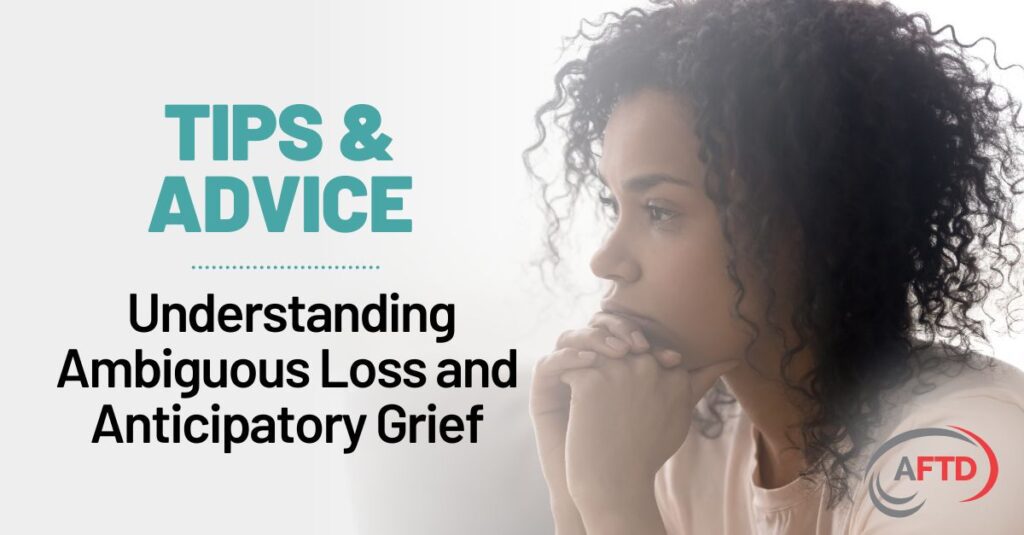Tips and Advice: Understanding Ambiguous Loss and Anticipatory Grief

Andy Atwood, a retired psychotherapist and clergyman, knows about grief. In addition to working as a grief counselor, he experienced grief firsthand after the 2021 death of his beloved younger brother, who had FTD. Last year, after the family of Bruce Willis announced the actor had been diagnosed with FTD, he found that “yet another wave of grief washed over me.”
We tend to think of grief as having five stages — denial, anger, bargaining, depression, acceptance — a linear process that moves from one stage to the next until we complete all of them. But as Atwood noted in a Medium blog post last year, grief rarely progresses in so linear a fashion. “There is no step-by-step grief process,” he wrote.
Indeed, one of grief’s defining features is its tendency to recur long after a loved one’s death, sometimes randomly, sometimes triggered by a specific event or a news story like the Willis announcement. “Grief is easy to avoid, until it waves over you again and again,” Atwood wrote. “Steady one moment, and then a remembrance visits and there you are again — sad, sad, sad.”
Some compare living with grief to a swinging pendulum. Following a loved one’s death, you may find yourself shifting back and forth between two radically different states of mind. First, you spend time and effort processing strong emotions that are associated with grief, such as sorrow, longing, and anger. But then the pendulum swings, and you find yourself needing to focus instead on the important but unremarkable tasks of everyday life (working, managing the children and the home, attending to one’s own needs). As the pendulum keeps swinging, new feelings like guilt and confusion arise, complicating the grieving process.
Ambiguous Loss and Anticipatory Grief
In FTD, grief can be even more complicated due to the related phenomena known as ambiguous loss and anticipatory grief. As defined by grief expert Dr. Pauline Boss, ambiguous loss occurs when families find themselves caring for someone whose personality and behavior has changed dramatically from the person they once knew. It is a hallmark characteristic of FTD. People diagnosed with FTD can also experience ambiguous loss, as they mourn their independence and certain cherished personal traits and abilities.
Anticipatory grief, meanwhile, is the grief we feel when we anticipate a loss. In a 2020 article and radio interview, Rudy Fuehrer, an FTD care partner to his wife, Karin, summarized his own anticipatory grief: “I was looking forward to a retirement at 65 or 67 and being postured correctly, maybe downsizing … [but because of the diagnosis] all the plans that we had, or thoughts that we had, just got sidetracked so quickly.”
Not long ago, Fuehrer found a birthday card Karin had once given him. Inside was a note she wrote. He thought about taking it home to show her but changed his mind. “The grief is that if I showed her this card and showed her her handwriting, she’d say ‘I didn’t give you this card,’” Fuehrer said. “That’s grief.”
Managing Grief on the FTD Journey
AFTD has produced numerous resources to help you manage grief during your own FTD journey, whether you have been diagnosed with FTD, provide care for a loved one, or are a family member or close friend of someone living with the disease:
- Walking with Grief: Loss and the FTD Journey is a comprehensive, 48-page booklet, compiled with assistance from care partners and people who have been diagnosed, contains practical advice and firsthand words of encouragement from people who know both grief and FTD personally. Click here to download Walking with Grief.
- Living the Grief of FTD is an AFTD Educational Webinar first presented in 2020. Mary O’Hara, LCSW of the University of Colorado explores the unique experience of living with grief during FTD, processing grief after an FTD death, and discovering ways to move forward and deepen our wells of resilience. You can also read this 2022 article by Mary O’Hara, about ambiguous loss and FTD, including six tasks to help build resilience.
- People living with an FTD diagnosis who are struggling with grief may benefit from “It’s FTD: Navigating the Emotions of a New Diagnosis,” a session from AFTD’s 2021 Education Conference presented by Mary O’Hara.
By Category
Our Newsletters
Stay Informed
Sign up now and stay on top of the latest with our newsletter, event alerts, and more…
